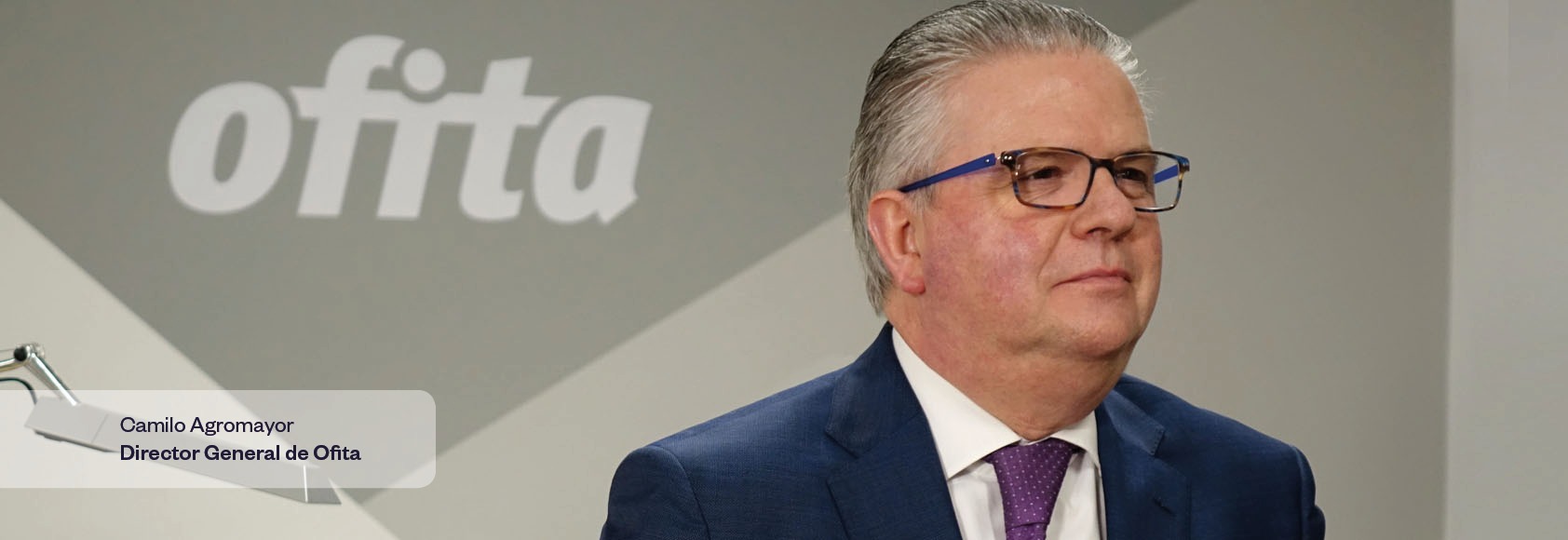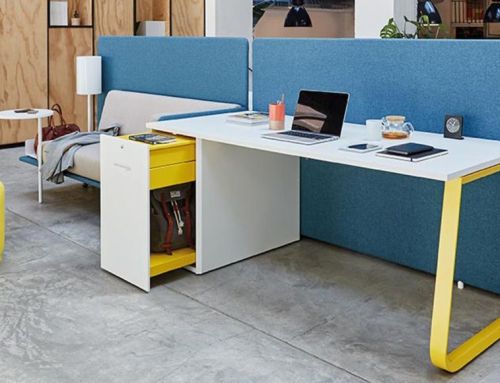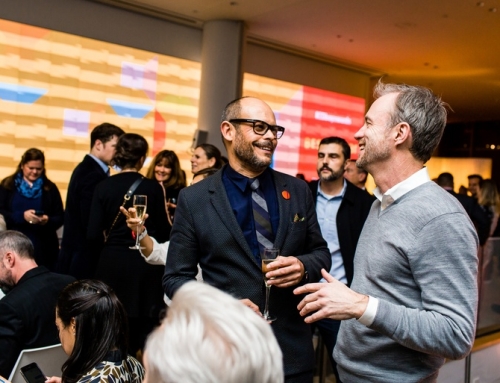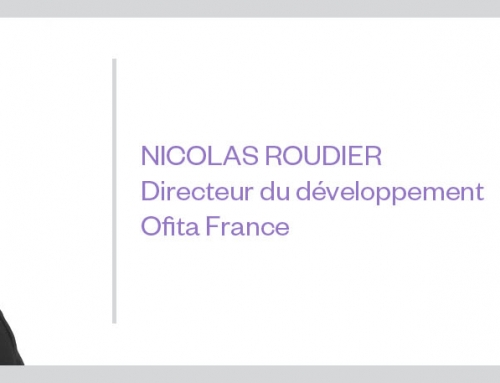Camilo Agromayor, CEO of Ofita, has just been interviewed by the economic newspaper Estrategia Empresarial, which echoes the company’s favourable outlook for the coming years, with growth of 10-20%.
In the interview, Camilo Agromayor explains Ofita’s lines of activity and the added value it offers companies: “Since 1969, Ofita has been designing and manufacturing office furniture, but in addition, beyond the product, it offers a complete range of added value, from renting to advice on how a company can optimise its space or how it can help people to feel good in the office and give the best of themselves.
4 differential values of Ofita, according to Camilo Agromayor
In this sense, we can talk about Ofita’s 4 differential values:
- We are specialists in creating human spaces for work, and this involves factors such as ergonomics and sustainability.
- We manufacture furniture that accompanies companies in their transformation processes, facilitating their new work dynamics, which today are more flexible, agile and collaborative.
- Our ability to customise furniture for each company, reinforcing their brand and adapting it to their way of working and their people.
- We are a global company, which means that we furnish our clients’ headquarters wherever they are located; we accompany them in all their international implementations.
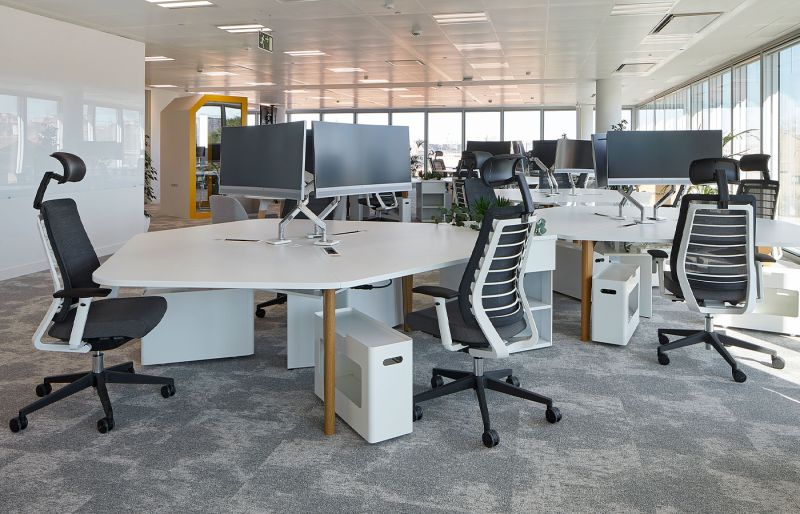
Professional and home office furniture
Camilo Agromayor refers to Ofita’s two types of business: the professional and home office sectors, an area that has been greatly strengthened by the pandemic, and which offers the same Ofita quality and design for both the private public (who can buy just one chair) and for those companies that – concerned about the comfort and health of their workforces – are providing their employees with the furniture with which they telework at home.
Regarding the professional line, any company can be an Ofita client, and in fact we have companies of all sizes, although it is true that we specialise in furnishing the corporate headquarters of large companies. We work directly with them or through architectures, depending on the case.
Our clients in the last year include Roche Gis, Endesa, Elecnor, Cuatrecasas, Affinity, Lacer, Naturgy, AXA, Banco Santaner and Mapfre, among others.
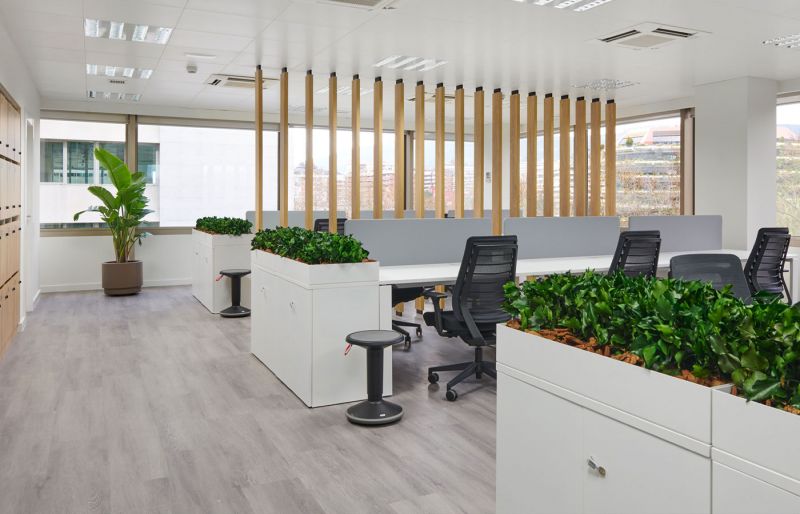
¿ Hacia dónde evoluciona el diseño de los espacios / mobiliario de trabajo ?
“La crisis sanitaria desencadenó un impacto de magnitud sin precedentes para organizaciones grandes y pequeñas. De la noche a la mañana, y sin preparación alguna en la mayoría de los casos, las empresas se vieron obligadas a enviar a sus plantillas a teletrabajar y a adoptar nuevas relaciones laborales flexibles y en remoto. En realidad, estos cambios ya estaban ahí, pero la pandemia los ha acelerado”, afirma Camilo Agromayor.
Esto se traduce en un cambio fundamental en el significado del lugar de trabajo; hemos entrado en la era de la oficina híbrida. Según Camilo Agromayor, esto no significa que la oficina pierda sentido; “al contrario; de hecho, pone en valor su rol como facilitador de las nuevas dinámicas de trabajo y culturas corporativas”.
“En lo que respecta a su diseño, el mundo de la oficina probablemente poco tendrá que ver con el espacio que conocíamos. Las empresas están rediseñando sus oficinas, apostando por espacios más amigables y mucho más flexibles, acordes con la nueva realidad del trabajo”, añade.
En este repensar el diseño de oficinas, son claves, según el director general de Ofita, los espacios para el trabajo en equipo y las relaciones interpersonales, que son versátiles, polivalentes y no asignados. En muchas empresas, además, también los puestos de trabajo individuales, pasan a ser de todos y no de una persona concreta.
Los nuevos entornos de trabajo incluyen también espacios donde realizar funciones que en casa no se ejecutan de forma eficaz. Este es el caso, por ejemplo, de los espacios de concentración o de las áreas más creativas para la innovación o/y metodologías Agile.
Where is the design of work spaces / furniture evolving towards?
“The health crisis unleashed an impact of unprecedented magnitude for organisations large and small. Overnight, and without any preparation in most cases, companies were forced to send their workforces to telecommute and adopt new flexible and remote working relationships. In reality, these changes were already there, but the pandemic has accelerated them,” says Camilo Agromayor.
This translates into a fundamental change in the meaning of the workplace; we have entered the era of the hybrid office. According to Camilo Agromayor, this does not mean that the office loses meaning; “on the contrary; in fact, it enhances its role as a facilitator of new work dynamics and corporate cultures”.
“In terms of design, the office world will probably have little to do with the space we used to know. Companies are redesigning their offices, opting for friendlier and much more flexible spaces, in line with the new reality of work,” he adds.
In this rethinking of office design, the key, according to Ofita’s general manager, are spaces for teamwork and interpersonal relationships, which are versatile, multi-purpose and not assigned. In many companies, moreover, even individual workstations are becoming everyone’s and not just one person’s.
The new work environments also include spaces where functions that are not performed efficiently at home can be carried out. This is the case, for example, of concentration spaces or more creative areas for innovation and/or Agile methodologies.
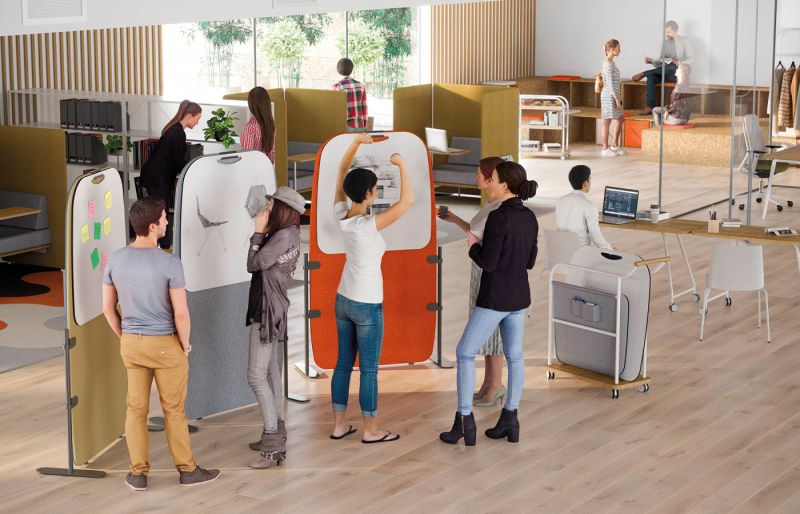
These new spaces for innovation are changing the image of the office. The traditional concept of the workstation, with a desk, filing cabinet and chair, where we spend the entire working day seated, is giving way to completely different spaces: mobile desks and whiteboards, stands, furniture for working while standing up…
And how is Ofita adapting to these trends?
“If the environment is flexible, mobile and multipurpose, at Ofita we understand that post-covid office furniture should also be flexible, allowing the transformation of the space, depending on the different activities or projects to be carried out at any given time or the number of people,” says Camilo Agromayor.
These are the new Ofita lines. For example, the Forthink line, with its versatile and mobile pieces, such as blackboards, stands or panels, embodies the new office concept.
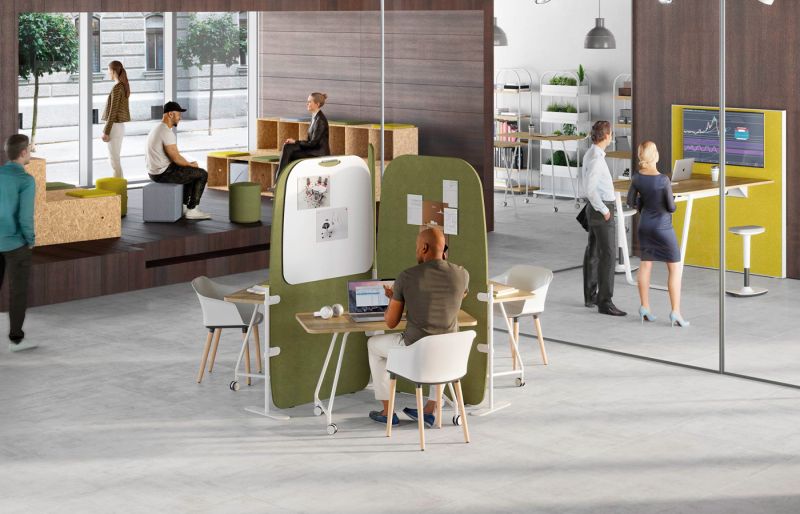
Forthink
“On the other hand, the incorporation of technology in furniture is extremely important because if today we can talk about hybrid work models and flexibility, it is thanks to technology that allows us to communicate from anywhere. I would also point out that people have changed; we are, for example, much more demanding of companies in areas such as social responsibility and sustainability, and the office has to respond to this demand”, he says.
In addition, Ofita’s CEO reminds us that more than ever, safety, health and wellbeing must take precedence in office design. “The focus must be on people, which will lead us to rethink them to make them healthy spaces, from the distribution of spaces (minimum distances, separation elements, etc.), ergonomic furniture that is increasingly adaptable to the user and the use of antimicrobial materials that allow frequent cleaning and disinfection”.
According to Camilo Agromayor, another important variable is the need for highly flexible spaces and easily adaptable and reconfigurable furnishing solutions that can respond to all the specific needs of companies.
Ofita is committed to and promotes the circular economy
The Estrategia Empresarial interview makes special mention of the importance Ofita gives to circularity and sustainability in its processes and products, which “is enormous”, emphasises Camilo Agromayor. “In fact, it is one of Ofita’s hallmarks and a field in which it has always been a pioneering company, and has been recognised as such. Sustainability at Ofita is endorsed by the most demanding international certificates such as ISO 14006 in eco-design and environmental improvement of products, ISO 14001 in clean production and environmental protection…”.
In addition, in 2019, Ofita became the first Spanish company in the office furniture sector with LEVEL® sustainability certification, level 2.
LEVEL® is the most comprehensive sustainability standard in Europe in the sector; it takes into account European legislation, the principles of Green Public Procurement and the European Union’s guidelines for the circular economy.

The European LEVEL® certification process establishes that a product is sustainable from multiple perspectives, assessing not only the characteristics of the product, but also those of the organisation and the facilities where the furniture is manufactured, taking into account criteria such as the company’s social responsibility, its energy use and its impact on the environment and human health.
Ofita products have also been eco-designed for many years. This means identifying, at the very moment a product is designed, all the environmental impacts that may occur in each of the phases of its life cycle, in order to try to reduce them to a minimum, without detriment to its quality and applications.
Innovation and internationalisation at Ofita, according to Camilo Agromayor
Camilo Agromayor also talks about innovation, specifying that “it is transversal to the entire company, and has a significant impact on areas such as the design and development of new products, the quality and sustainability of Ofita furniture and the company’s activity”. “At the moment, we are focused on the development of products for new ways of working, many in more informal areas, such as soft seating, others designed for innovation, including mobile furniture, agoras, etc.”.
“Moreover, the concept of open space as we know it no longer makes sense in the hybrid office. In today’s offices there are different spaces for different uses, both collaborative and for greater privacy. For this reason, Ofita is adding new products to its portfolio, such as acoustic booths, and even technological solutions for managing and booking all this variety of spaces“.

In this interview, among other topics, he also talks about internationalisation: “Ofita has always been a company with a global vision; in fact, its internationalisation began in the early nineties, with the creation of dealerships in Latin America from which we began to prospect and enter local markets. Today, we have our own structure in Paris and Lisbon, from where we serve our two preferred markets, France and Portugal, and where we have recently furnished the offices of Metabo, Affinity, Schneider, Ista, Bergerat Monnoyeur and Abicyclette, in France, and Cuatrecasas, Mapfre and Banco Santander in Portugal, for example,” explains Camilo Agromayor.
“But we are present all over the world because we support our clients in their local implementations in any country. This is the case of Cuatrecasas, Puig or Vestas, for example, whose offices – wherever they are located – are equipped with Ofita furniture”.
